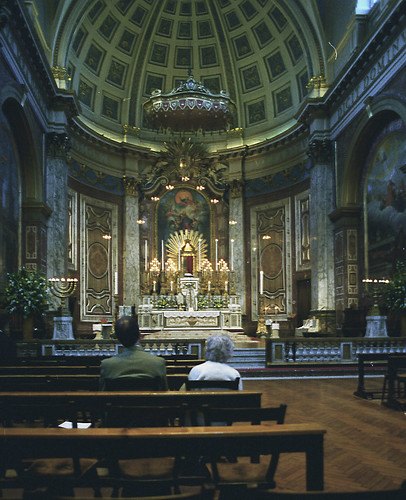The influx of Muslims into Western Europe has at least had the benefit that it has led to an increase in public knowledge of Islam. The conclusion of Ramadan, for instance, this week, produced a crop of articles on the subject. Moslems in northern Europe have a hard time, with sunrise in Stockholm, for instance, at 4.40 am and sunset at 9 pm - a lack of universality that is evidence, I would suggest, that Islam is not of divine origin.
Hilaire Belloc regarded Islam as a heresy of Christianity and devoted an entire chapter to it in his book The Great Heresies. Belloc also drew attention to the similarities between Islam and the residual Calvinism that is an important strand in religion in the USA. The following is an extract.
Mohammedanism was a heresy: that is the essential point to grasp before going any further. It began as a heresy, not as a new religion. It was not a pagan contrast with the Church; it was not an alien enemy. It was a perversion of Christian doctrine. It vitality and endurance soon gave it the appearance of a new religion, but those who were contemporary with its rise saw it for what it was not a denial, but an adaptation and a misuse, of the Christian thing. It differed from most (not from all) heresies in this, that it did not arise within the bounds of the Christian Church. The chief heresiarch, Mohammed himself, was not, like most heresiarchs, a man of Catholic birth and doctrine to begin with. He sprang from pagans. But that which he taught was in the main Catholic doctrine, oversimplified. It was the great Catholic world on the frontiers of which he lived, whose influence was all around him and whose territories he had known by travel which inspired his convictions. He came of, and mixed with, the degraded idolaters of the Arabian wilderness, the conquest of which had never seemed worth the Romans' while.
If anyone sets down those points that orthodox Catholicism has in common with Mohammedanism, and those points only, one might imagine if one went no further that there should have been no cause of quarrel. Mohammed would almost seem in this aspect to be a sort of missionary, preaching and spreading by the energy of his character the chief and fundamental doctrines of the Catholic Church among those who had hitherto been degraded pagans of the Desert. He gave to Our Lord the highest reverence, and to Our Lady also, for that matter. On the day of judgment (another Catholic idea which he taught) it was Our Lord, according to Mohammed, who would be the judge of mankind, not he, Mohammed. The Mother of Christ, Our Lady, "the Lady Miriam" was ever for him the first of womankind. His followers even got from the early fathers some vague hint of her Immaculate Conception.
But the central point where this new heresy struck home with a mortal blow against Catholic tradition was a full denial of the Incarnation.
Mohammed did not merely take the first steps toward that denial, as the Arians and their followers had done; he advanced a clear affirmation, full and complete, against the whole doctrine of an incarnate God. He taught that Our Lord was the greatest of all the prophets, but still only a prophet: a man like other men. He eliminated the Trinity altogether.
With that denial of the Incarnation went the whole sacramental structure. He refused to know anything of the Eucharist, with its Real Presence; he stopped the sacrifice of the Mass, and therefore the institution of a special priesthood. In other words, he, like so many other lesser heresiarchs, founded his heresy on simplification.
Catholic doctrine was true (he seemed to say), but it had become encumbered with false accretions; it had become complicated by needless man-made additions, including the idea that its founder was Divine, and the growth of a parasitical caste of priests who battened on a late, imagined, system of Sacraments which they alone could administer. All those corrupt accretions must be swept away.
There is thus a very great deal in common between the enthusiasm with which Mohammed's teaching attacked the priesthood, the Mass and the sacraments, and the enthusiasm with which Calvinism, the central motive force of the Reformation, did the same. As we all know, the new teaching relaxed the marriage laws - but in practice this did not affect the mass of his followers who still remained monogamous. It made divorce as easy as possible, for the sacramental idea of marriage disappeared. It insisted upon the equality of men, and it necessarily had that further factor in which it resembled Calvinism - the sense of predestination, the sense of fate; of what the followers of John Knox were always calling "the immutable decrees of God."
Mohammed's teaching never developed among the mass of his followers, or in his own mind, a detailed theology. He was content to accept all that appealed to him in the Catholic scheme and to reject all that seemed to him, and to so many others of his time, too complicated or mysterious to be true. Simplicity was the note of the whole affair; and since all heresies draw their strength from some true doctrine, Mohammedanism drew its strength from the true Catholic doctrines which it retained: the equality of all men before God "All true believers are brothers." It zealously preached and throve on the paramount claims of justice, social and economic.
Now, why did this new, simple, energetic heresy have its sudden overwhelming success?
One answer is that it won battles.


